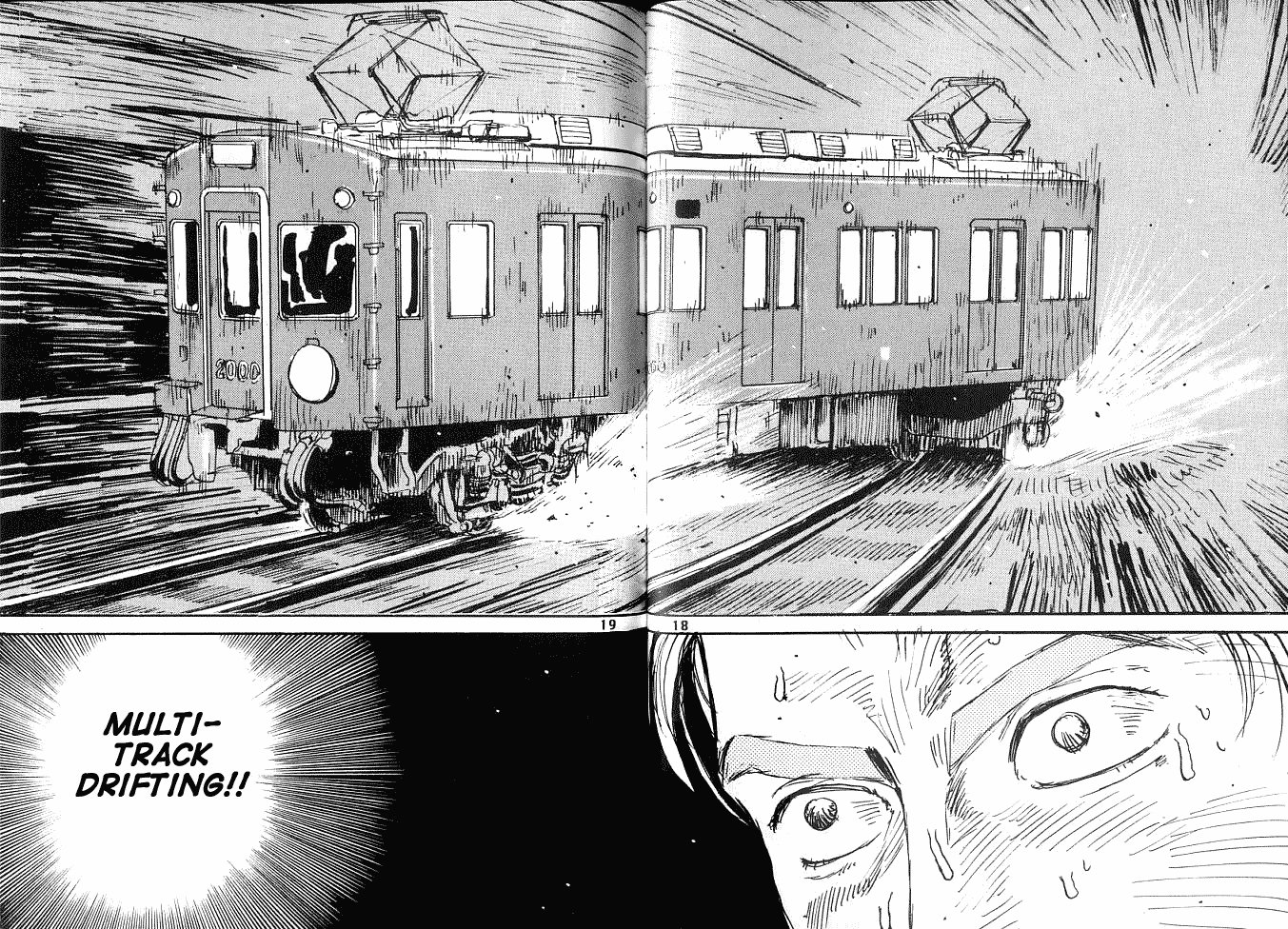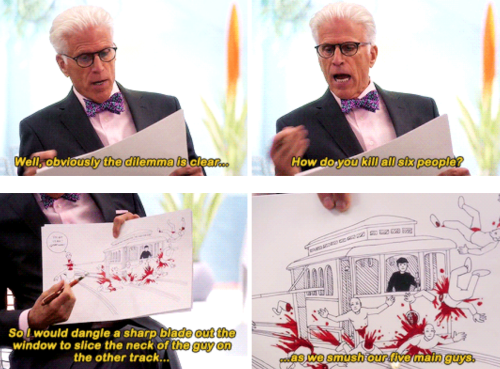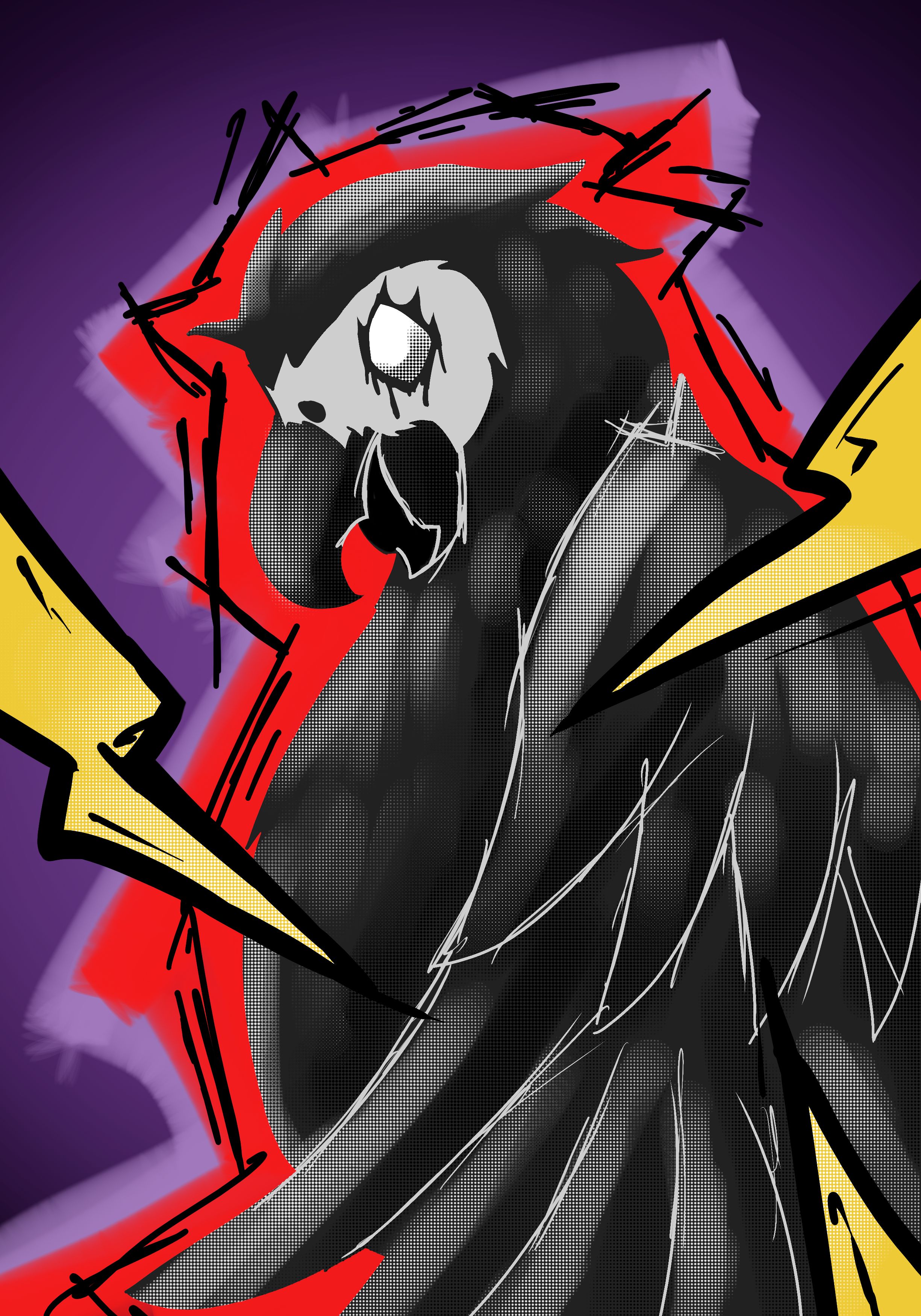- cross-posted to:
- [email protected]
- cross-posted to:
- [email protected]
Life, uh, finds a way.

M-M-M-M-MONSTER KILL
VEHICULAR MANSLAUGHTER
DEJA VU!
I have been in this place before
*death finds a way.
“life finds a way [to end]” is valid here :)
Came here for this.
Gah, you beat me to it.
Yeah, this only works if the two tracks are farther apart than the trolley’s trucks
The KANSEI-DORIFTO energy generated by the trolley will distort the tracks into an appropriate shape
No they mean flipping between the wheels of one truck
That makes more sense, lol. It would probably just derail and kill everyone then, highly ethical outcome.
Nuh uh
I love how a manga shows the reality of the situation.
I’ve never understood why people have such a hard time with the trolley problem. Obviously, if you pre-emptively move that lone guy over to the rail with the five, you can hit all six at once to maximize your score. Just requires a bit of setup.
Simply hit all six with multi track drifting
Y’all kids and your speedrun strats. Some of us have poor reaction time and need to perform safety setups.
That’s exactly what I think would happen with the derailing technique described here. Plus you might lose A couple in the trolley as well.
Are you this kid?
Or just do whatever you feel like in the moment and then jump in front of the trolley to escape all consequences.
Well sure Batman can beat the trolley problem with prep time.
Here is an alternative Piped link(s):
“Well, obviously, the dilemma is clear: how do you kill all six people?”
Piped is a privacy-respecting open-source alternative frontend to YouTube.
I’m open-source; check me out at GitHub.

Or the trolley potentially carrying dozens of people falls over, killing and injuring more people than would have been otherwise.
Problem EXTRA solved, those jackasses were too lazy to hit the emergency brakes and they can answer to FSM for their crimes.
going over people also soulnds like it would cause a derilment
A train wagon easily weights 20 tonnes and more. If it goes just at 50 kph, it has an impulse of 278.000 kg*m/s. Respectively 278.000 Ns. According to some googling human bones tend to break at around a force of 4.000 N.
Realistically the train is just going to flatten whatever flesh and bones are between the wheel and tracks.
It very well might. But then you have to add the people on the tracks to the death count.
Sir the Trolley has derailed in an Ohio neighborhood spilling vinyl chloride everywhere. Lets light it all on fire to get rid of it.
We did it Patrick; we saved the city!
They did say CONTROLLED derailment…
Frame perfect trolley skip
Might need TAS

I’m always sad when I see this stuff. I know it’s all jokes and whatnot, but the entire meme has been born out of a fundamental misunderstanding of the dilemma that the trolley problem is supposed to represent.
The question isn’t, and has never been whether you throw the switch or not. The question is that if you throw the switch, are you responsible for killing the one, or conversely, if you do nothing, are you responsible for killing the others?
Whether you throw the switch or not is immaterial to the point. Kill one or kill four (or whatever) it doesn’t matter. You didn’t create that scenario, so by your inaction several people died, are you responsible for their deaths, considering you never put them in that position? Or are you exempt of blame since you basically chose to be an onlooker?
I don’t really blame anyone for not getting it, I sure didn’t for a really long time until my friend rephrased the same dilemma in a different way (and omitted the trolley): you go to lunch and have a delicious subway sandwich, but you were not very hungry so you only are half. On your travels from Subway to wherever, you pass by a homeless person begging for food. If you decide to ignore them and keep your food for yourself for later, and that person dies of starvation later that same day because of it, are you responsible for their death?
In addition to philosophical questions, the Trolley Problem is also a good tool in psychology to study human ethical reasoning. It turns out that people’s intuitive responses vary quite a lot based on details that seem like they shouldn’t make a difference. If I’m remembering correctly, I believe that a lot more people say that they would divert the trolley if they imagine that they were observing the situation from a gantry high above the tracks, rather than in close proximity to the person who would be killed thereby.
For anyone interested, there is a nice video series on these comics by “CosmicSkeptic” on Youtube. He discusses some of the memes, but brings them nicely into a philosophical context at the same time.
See, it is kind of a Batman philosophy.
When the Joker presents Batman with a trolley problem [Save Robin or Save Catwoman], Batman always finds a way to circumvent it and save both. Because he is Batman.
People will always try to get the best out of the situation, even though that isn’t what the exercise is about.
Not to mention that the whole philosophical bend of the question is pointless because we’re already aware of the concept of negligence.
It’s the first question in a battery of questions designed to force you to be aware of inconsistencies in your ethical framework. The first answer is supposed to be obvious: Yes, you throw the switch, but most people’s reason for that creates a very messy precedent that the distinction between action and inaction doesn’t matter, only the outcome, which later questions can exploit.
The idea itself can be a rather interesting thing to explore as a thought experiment. Obviously the premise of the trolley problem is ridiculous, especially today since trains and especially trolleys are becoming much more rare for most people (with the exceptions for railroad tracks across roads, and passenger rail lines like subways and surface passenger services like we see in bullet trains). There are still railcars, like light rail transit in cities sometimes, but again, it’s fairly rare overall for the general public as a whole.
The idea of trolleys is a fairly outdated one and most of the safety systems in modern allegories are so robust that dangers are generally minimized.
Nevertheless, the moral quandary of whether you are responsible for injury or death as a result of your action (or inaction) is a fascinating mental exercise and has resulted in more than one discussion of adjacent morality concerns with the friend I mentioned. It’s fascinating to study overall, even in a casual context like we do.
I understand there’s a lot more to the picture when dealing with it in a more formal study, and that this question is only one piece of the puzzle when performing such studies.
The part that frustrates me more than anything is that people stop at whether or not to pull the lever, and run with it in memes and alternative solutions, rather than grappling with the moralities that are the root of the original question as part of the study. This is supposed to invoke a deep consideration about your actions and the responsibilities you may or may not be accepting when getting involved in a situation, and how your specific world view and moral “code” (so to speak) factors in. All of the memes and reposts of it, to me, always feel like it cheapens the meaning behind the initial problem as stated. However I understand that highly involved analytical thinking that forces you to consider all of those deep underlying concepts, requires significant mental work; system 2 work, of you will. Where you have to engage with your analytical “slow” thinking mind to really grasp, and our default reaction, as a species is that such thinking is usually something that will put us in danger, since our fast thinking system 1, can easily just blurt out an answer without considering it any further, saving significant mental effort.
I understand why people reduce this dilemma to the mechanical components of throwing a switch, but I always feel like they’re missing the entire point of the exercise.
what if the trolley running in 88mph?
Then we will see some serious shit!
Then the trolley will fire wheel itself into the future and the people on the tracks will be spared
*burnt
Move the lever at 89mph.
air time
With a bit of luck the debris will catch all the people tied to the tracks.
So now you killed the 10 people that were in the train, congrats.
Removed by mod
Melbourne tram 2012 incident would like a word.
Never forget.
Removed by mod
Removed by mod
Yeah, there has never been a single death from a trolley derailment, no sir not a one.
Removed by mod
The people in the train are the only ones with any power to stop it, but they’re divided between “smash everyone quickly” and “smash everyone slowly” factions.
There’s an old Talaxian expression: “When the road before you splits in two, take the third path.”
That could be misinterpreted to mean “turn around and go back the way you came”
Which would be a valid solution to the trolly problem…
Hmm I feel the urge to tuvix…
That’s a different story all together. In that case, there really were only 2 options and one was clearly morally wrong so Janeway had to do exactly that
Both choices were morally dubious. Tuvok and Nelix wanted to be alive just as much as Tuvix
There’s an old saying in Tennessee (I know it’s in Texas, probably in Tennessee) that says, take the first path, shame on… shame on you. The third path- you can’t get fooled again.
This made me laugh much harder than I’m willing to admit
Seems I’m always looking for that third option.
IRL physical systems there always is, that’s how we got from horses to trains.
So the allegory here is if you’re faced with a systemic lose-lose situation, fuck with the control system.
I don’t believe in a no-win scenario.
- James T. Kirk
I don’t think this person knows what “controlled” means.
You control when it happens.
Or it’ll run on both tracks.
You’re missing the point. The trolley problem represents a moral dilemma. The question should instead be: is any further derivation of this meme ethical? Is responding in a comment immoral in itself?
Everyone knows what the trolley problem is about. I think it’s you who’s missing the point. Instead of blindly accepting the unacceptable solutions that are offered, come up with your own, better solution.
deleted by creator
A concrete example of this is doctors and hospitals creating guidelines about how to triage care when ICUs were/are full because of unmitigated spread of COVID.
It is definitely an “interesting” phylisophical question to ask:
“If a long term ventilator user comes into the ICU, with the ventilator they own and brought from home, and they are less likely to survive than an otherwise healthy young man who needs a respirator due to COVID infection, is the morally best choice to steal the disabled person’s ventilator (killing them) and use it to save the young man’s life?”
The policy question that should be asked instead, and never really ways, is “How do we make sure that we never get to the point where we have so many people in the ICU from a preventable disease that we run out of respirators and need to start choosing who to let die?”
This is not just a hypothetical question:
Disabled people continue to plead with us for the bare minimum, like requiring doctors who work with immunocompromised patients to wear N95 respirators while treating those patients.
We continue to chose to stack more people on both sets of tracks instead.
My critique of the meme is because it basically says “What if we just never had the ICU full at all?”
But like, much more glib.
Isn’t this comment basically joking? Why is everyone taking it so seriously lol
Too dry, it seems
Well yes but actually no
Train has speed momentum, and nobody is thinking about the passengers inside the train



















